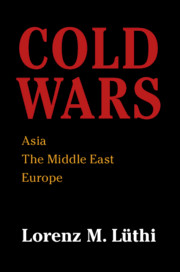Book contents
- Cold Wars
- Cold Wars
- Copyright page
- Dedication
- Contents
- Maps
- Acknowledgments
- Note on Names, Transliterations, and References
- Abbreviations
- Introduction
- 1 From High Imperialism to Cold War Division
- Part I Elusive Unities
- Part II Asia
- Part III The Middle East
- Part IV Alternative World Visions
- Part V Europe between the Superpowers
- Part VI European Détente
- Part VII The End of the Regional Cold Wars
- Introduction to Chapters 20 to 22
- 20 The Middle East
- Chapter 21 Asia
- 22 Europe
- 23 The End of the Superpower Cold War
- 24 Legacies of the Cold War
- Conclusion
- Notes
- Index
Conclusion
from Part VII - The End of the Regional Cold Wars
Published online by Cambridge University Press: 19 March 2020
- Cold Wars
- Cold Wars
- Copyright page
- Dedication
- Contents
- Maps
- Acknowledgments
- Note on Names, Transliterations, and References
- Abbreviations
- Introduction
- 1 From High Imperialism to Cold War Division
- Part I Elusive Unities
- Part II Asia
- Part III The Middle East
- Part IV Alternative World Visions
- Part V Europe between the Superpowers
- Part VI European Détente
- Part VII The End of the Regional Cold Wars
- Introduction to Chapters 20 to 22
- 20 The Middle East
- Chapter 21 Asia
- 22 Europe
- 23 The End of the Superpower Cold War
- 24 Legacies of the Cold War
- Conclusion
- Notes
- Index
Summary
The three Great Powers at the end of World War II and the two superpowers after the mid 1960s experienced tight limits to their political, economic and military power. They were usually most successful if they were able to influence pre-existing regional developments. Particularly the Middle East defied outside influence. Conflicts and developments usually fell into one of three categories: those without Cold War roots, those dating back to the Bolshevik challenge of 1917, and those caused by the Cold War after World War II. Over the course of four decades until the late 1980s, they collectively affected structural change. However, middle powers and smaller agents enjoyed different levels of agency, ranging from much influence, like communist China, to minute, like the Palestinians. Yet, in general, agency steadily increased over the course of the Cold War.
Information
- Type
- Chapter
- Information
- Cold WarsAsia, the Middle East, Europe, pp. 605 - 613Publisher: Cambridge University PressPrint publication year: 2020
